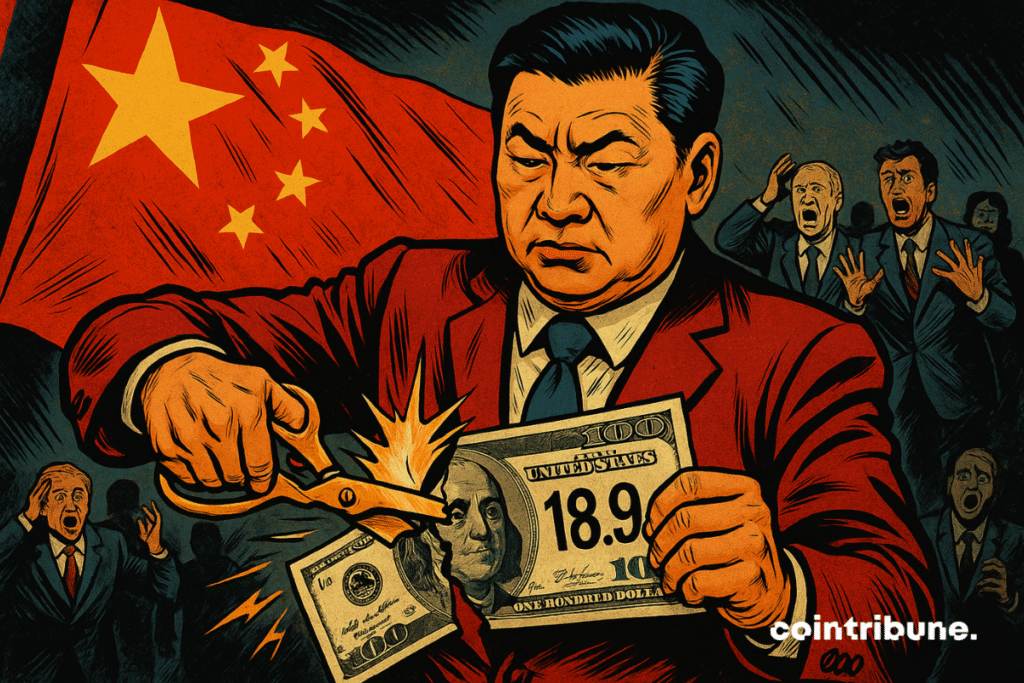Beijing’s Economic Moves Send Shockwaves Through Global Markets
China’s latest policy decisions hit like a sledgehammer—traders scramble as the world’s second-largest economy tightens its grip.
Markets recoil: From Wall Street to crypto exchanges, Beijing’s opaque maneuvers trigger volatility spikes. Even Bitcoin isn’t immune to the CCP’s economic gravity.
The irony? Hedge funds still betting on ’stability’ from the same government that just rewrote the rulebook overnight. Some never learn.

In brief
- China sells $18.9 billion in US debt and slips to 3rd place globally.
- The United Kingdom surpasses Beijing in holdings, amounting to $779.3 billion.
- Moody’s downgrades the US rating, triggering concerns over US budget sustainability.
- The Chinese economy now prefers to shorten its maturities and quietly diversify its reserves.
Beijing Relents on Treasury Bonds
In March 2025,. Its portfolio decreased. This significant drop occurs amid a climate of distrust, against the backdrop of a tariff war with the United States. Even though the TRUMP administration has suspended part of its surtaxes for 90 days, confidence remains shaken.
among foreign creditors of the United States. The United Kingdom now surpasses it, with a portfolio valued at $779.3 billion. At the top is Japan, still holding over $1.13 trillion in US bonds.
But this is. For many Chinese analysts, this decision aims to protect from an unpredictable US economy. Yu Yongding, former adviser to China’s central bank, states:
China must develop a series of countermeasures through repetitive scenarios. It must protect the security of its overseas assets.
This strategic MOVE also comes at a time when. A signal that the US struggles to master its own fiscal trajectory. In this context, Beijing might be tempted to reshape its exposure strategy to the dollar.
Diversify, Shorten, Reposition: The Chinese Economy in Strategic Retreat
This relative disengagementBrad Setser, former US Treasury official, analyzes China’s gesture this way: “I think China is seeking to reduce duration rather than exit the dollar.” In other words,, which are more liquid, over longer-term, more volatile bonds.
This decision aligns with a risk reduction logic. In a world where geopolitical tensions intensify, the Chinese economy cannot affordeven if it is American.
Data from March also reveals the growing prominence of other players:
- Japan: +$22 billion, totaling $1.13 trillion;
- Canada: +$20.1 billion, reaching $426.2 billion;
- Belgium: +$7.4 billion, totaling $402.1 billion (including Chinese accounts);
- Cayman Islands: +$37.5 billion, totaling $455.3 billion.
Meanwhile,, increasing market volatility. Additionally, 10-year bond yields ROSE from 3.86% to 4.59% over the following month.
Despite recent easing following a trade agreement with the United Kingdom and a Sino-American bilateral meeting, instability remains high. Because even if statistics show, distrust toward US economic policy persists.
The Global Economy Under Pressure: A Signal with Multiple Interpretations
The decline in Chinese holdings of US debt acts as. Beijing is not abandoning the US markets but methodically adjusting its positions – although there is fear of a possible takeover of bitcoin. The global economy could see this as a prelude to other, more radical future arbitrages.
BTCUSD chart by TradingViewThis transition is reflected through five key indicators:
- $27.6 billion: net amount of Chinese sales in long-term bonds;
- 20 years: first time in two decades that the United Kingdom surpasses China;
- $9.05 trillion: total foreign holdings in Treasury bonds (all-time record);
- 5%: weight of Chinese assets relative to US GDP;
- 90 days: duration of the recently decided Sino-American tariff truce.
This Chinese move does not yet violently disrupt the market. But: Beijing can modify its monetary levers at any moment in response to a tariff or political attack. Some analysts see this decision as a stress test: how far can the United States depend on the goodwill of its creditors?
In addition, China’s foreign reserves continue to grow through discreet channels, such as major state banks. These operations partly evade the radar of US Treasury statistics (TIC data), complicating any clear interpretation of flows.
China’s reduction of Treasury bonds resonates as a quiet but powerful alert. At BlackRock, some strategists believe Beijing could turn towards Gold or cryptocurrencies as fallback solutions. Because in a perpetually tense globalized economy, monetary independence becomes a strategic, almost vital, tool.
Maximize your Cointribune experience with our "Read to Earn" program! For every article you read, earn points and access exclusive rewards. Sign up now and start earning benefits.

